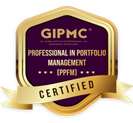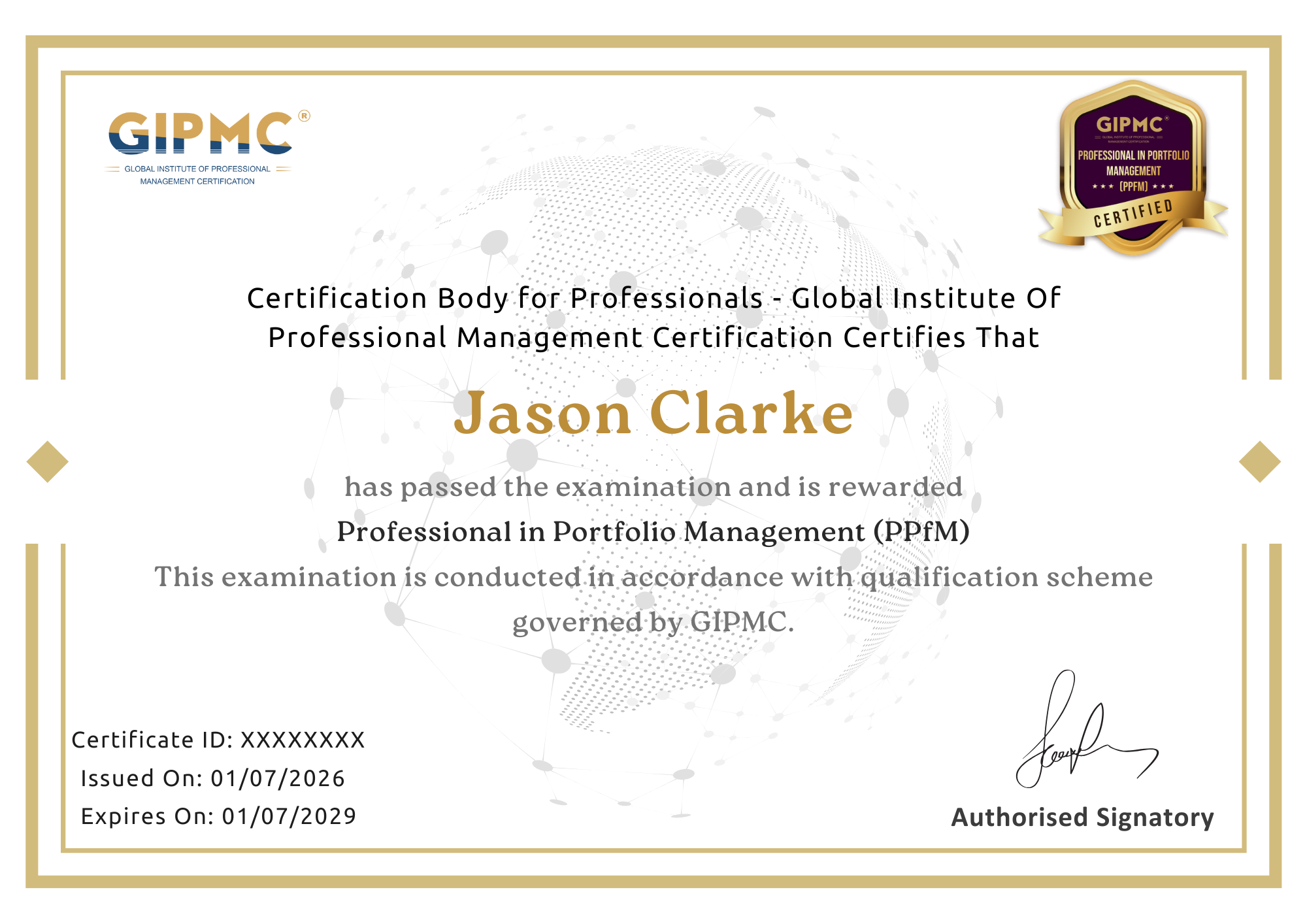Course Description
Managing Portfolios to Maximize Strategic Alignment, Value, and Organizational Performance
The Professional in Portfolio Management (PPfM) certification is a professional credential designed to develop, validate, and recognize capability in managing organizational portfolios of projects, programs, products, and initiatives to achieve strategic alignment, optimal value realization, and balanced risk.
This certification prepares professionals to establish, operate, and improve portfolio management practices that support executive decision-making, investment prioritization, and performance oversight. It emphasizes portfolio structure, prioritization, governance, benefits management, resource optimization, and continuous portfolio performance management.
PPfM goes beyond individual project or program oversight by equipping professionals with the enterprise-level perspective and
Why Professional in Portfolio Management (PPfM) from GIPMC?
Organizations increasingly manage dozens—or hundreds—of concurrent initiatives competing for limited resources. PPfM is industry-agnostic, framework-neutral, and execution-aware, enabling professionals to apply portfolio management principles across public, private, and regulated environments.
Key Advantages
-
Comprehensive portfolio management credential
-
Strong focus on strategic alignment and value realization
-
Framework-agnostic and methodology-neutral approach
-
Emphasis on governance, prioritization, and performance control
-
Career-oriented certification with enterprise relevance
PPfM is designed for professionals operating at the portfolio management and enterprise coordination level.
Market Relevance
As organizations increase investment complexity and transformation activity, portfolio management capability has become a critical differentiator.
-
60–80% of organizations report value leakage due to poor portfolio prioritization and governance
-
65–85% employer preference for professionals with formal portfolio management credentials
-
30–50% improvement in investment value realization through disciplined portfolio management practices
-
2x higher success rates in strategic initiative delivery when portfolios are actively governed and optimized
(Based on aggregated global portfolio management maturity, strategy execution, and enterprise performance trends.)
These figures demonstrate why professional portfolio management capability is essential for sustainable organizational success.
Who Should Pursue Professional in Portfolio Management (PPfM)? (Target Audience)
The Professional in Portfolio Management (PPfM) certification is suitable for professionals responsible for coordinating, prioritizing, and overseeing multiple initiatives, including:
-
Portfolio Managers and Portfolio Analysts
-
PMO and EPMO Professionals
-
Program Managers transitioning to portfolio roles
-
Strategy Execution and Transformation Professionals
-
Senior Project and Program Management Practitioners
-
Business and Functional Leaders managing initiative portfolios
-
Consultants supporting portfolio setup and optimization
Across industries, PPfM provides a structured framework for effective portfolio management practice.
Detailed Learning Outcomes
By earning the Professional in Portfolio Management (PPfM), candidates demonstrate the ability to:
1. Foundations of Portfolio Management
- Purpose and role of portfolio management
- Differences between projects, programs, and portfolios
- Portfolio value perspective
2. Portfolio Strategy and Alignment
- Translating organizational strategy into portfolio objectives
- Ensuring alignment across initiatives
- Managing strategic coherence
3. Portfolio Structure and Categorization
- Defining portfolio components and categories
- Grouping initiatives for visibility and control
- Managing different investment types
4. Initiative Identification and Intake
- Capturing and screening new initiatives
- Defining selection criteria
- Managing demand pipelines
5. Prioritization and Investment Decision-Making
-
- Prioritization models and scoring techniques
- Evaluating business cases
- Balancing value, risk, and cost
6. Benefits and Value Management
- Defining portfolio-level benefits
- Tracking value realization
- Ensuring benefits accountability
7. Portfolio Risk and Dependency Management
- Identifying portfolio-level risks
- Managing interdependencies
- Balancing risk exposure
8. Resource Capacity and Financial Management
- Portfolio-level resource planning
- Budget allocation and financial controls
- Optimizing utilization across initiatives
9. Portfolio Performance Monitoring
- Defining portfolio KPIs
- Monitoring health, progress, and value
- Supporting executive dashboards
10. Governance and Decision Structures
- Establishing portfolio governance bodies
- Decision rights and escalation paths
- Ensuring transparency and accountability
11. Portfolio Optimization and Rebalancing
- Adjusting portfolios based on performance and change
- Terminating or re-scoping initiatives
- Continuous optimization
12. Stakeholder Communication and Reporting
- Communicating portfolio status and insights
- Managing executive and stakeholder expectations
- Enabling informed decisions
13. Professional Practice and Portfolio Management Maturity
- Assessing portfolio maturity
- Continuous improvement of portfolio practices
- Preparing for advanced portfolio and governance roles
Professional and Career Benefits
Professional in Portfolio Management (PPfM) certified professionals are recognized for their ability to
- Manage portfolios aligned to organizational strategy
- Improve investment transparency and value realization
- Reduce initiative overload and resource conflict
- Strengthen governance and executive decision-making
- Enable consistent and predictable strategy execution
The certification supports career advancement into roles such as:
- Professional in Portfolio Management
- Portfolio Manager or Portfolio Analyst
- PMO or EPMO Manager
- Strategy Execution or Transformation Manager
- Enterprise Governance or Investment Manager
- Senior Program and Portfolio Leadership Roles
Certification Validity & Renewal
The Professional in Portfolio Management (PPfM) certification is valid for three (3) years from the date of certification award.
Renewal is designed to:
- Maintain professional credibility
- Ensure continued alignment with evolving portfolio management practices
- Protect the long-term value of the certification
Renewal Process Includes:
- Completion of defined continuing professional development or knowledge refresh requirements
- Successful renewal assessment or verification, as applicable
- Submission of renewal application before certification expiry
Timely renewal allows professionals to retain active certification status without interruption.








